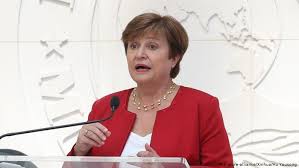The International Monetary Fund (IMF) has expressed serious concern about the surging inflation rates, debt stocks, and food crisis in Nigeria and other African, warning that if not properly managed could threaten the recoveries of the economies and push them into another recessionary abyss.
The Managing Director of the Washington-based multilateral financial institution, Kristalina Georgieva gave this warning in a just published report titled ‘Facing a Darkening Economic Outlook: How the G20 Can Respond.’
The IMF in the report stated that most countries in Africa could raise money from the global financial markets instead of domestic capital markets in order to tackle their rising fiscal and other macroeconomic challenges.
According to the Breton Woods institution’s Managing Director, as an immediate strategy to tackling the food crisis, food exporting countries must reverse recently imposed restrictions on food exports.
She explained: “Such restrictions are both harmful and ineffective in stabilizing domestic prices. Further measures are also needed to strengthen supply chains and to help vulnerable countries adapt food production to cope with climate change.
“The particularly difficult conditions in many African countries at this moment are important to consider. In my meeting with Ministers of Finance and Central Bank Governors from the continent this week, many highlighted how the effects of this, entirely exogenous, the shock was pushing their economies to the brink.
“The effect of higher food prices is being felt acutely as food accounts for a higher share of income. Inflation, fiscal, debt and balance of payments pressures are all intensifying.
“Most are now completely shut out from global financial markets, and unlike other regions don’t have large domestic markets to turn to. Against this backdrop, they are calling on the international community to come up with bold measures to support their people”, Georgieva added.
The development finance expert noted that the impact of the Russia-Ukraine war on the people and Ukraine’s economy had worsened, with shocks to commodity prices and an increase in the cost of living creating a crisis for hundreds of millions of people.
In addition, the IMF boss pointed out that inflation had risen above expectations and affected more than just the price of food and energy but leading major central banks to announce additional monetary tightening measures.






